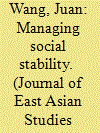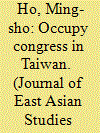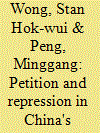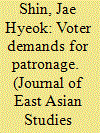|
|
|
Sort Order |
|
|
|
Items / Page
|
|
|
|
|
|
|
| Srl | Item |
| 1 |
ID:
137205


|
|
|
|
|
| Summary/Abstract |
Based on a town government's meeting memos between March 2001 and October 2007, annual work reports, and my interviews with local officials, I show that China's township governments have strived to contain, rather than resolve, social discontent. The tendency toward containment lies in two fundamental features of China's political institutions and central government strategy. First, in order to optimize the function of the petition system as a source of information without losing control, the Hu Jintao administration (2002–2012) passed regulations protecting the rights of petitioners on the one hand, and simultaneously put pressure on local officials to discourage petitioning, on the other. Second, the technical, institutional, and political features of China's cadre evaluation system encouraged local officials to take a short-term perspective on challenges, avoiding penalties rather than actually solving problems.
|
|
|
|
|
|
|
|
|
|
|
|
|
|
|
|
| 2 |
ID:
137207


|
|
|
|
|
| Summary/Abstract |
In opposition to a free trade pact with China, Taiwan's Sunflower Movement erupted in spring 2014 and occupied the national legislature for twenty-four days. Drawing from the recent debates on the relation between social movements and the state, I elaborate a revised polity model that focuses on the effects of elite disunity, threat, and movement strategy. The Sunflower Movement originated from a tactical misstep by the ruling party that created an immediate sense of threat from proposed closer economic ties with China, thereby facilitating protest mobilization. Student protesters were able to seize the national legislature because of an internal split within the ruling party and support from the opposition party. However, the failure to further exploit these favorable opportunities exposed the movement to government repression. Fortunately for the movement, the disunity among elites helped the activists manage a dignified exit, which they could claim as a success.
|
|
|
|
|
|
|
|
|
|
|
|
|
|
|
|
| 3 |
ID:
137206


|
|
|
|
|
| Summary/Abstract |
China has established a petition system to elicit information about grievances. However, the petition system may have perverse effects because it also reveals to the center the failure of local-level officials to resolve those grievances. Anecdotal accounts suggest that local officials have incentive to silence petitioners, often with the use of repression. In this article we study whether non–regime threatening petitions would provoke local governments' coercive response. To tackle the endogenous relationship between petition and repression, we take advantage of a natural experiment afforded by a change in hydroelectricity policy in China. In particular, we use provincial hydropower outputs as an instrument to identify citizen petitions. We find that citizen petitions significantly increase a province's spending on its repressive apparatus. The results suggest a paradoxical outcome of China's petition system: while it may help reduce the national authority's use of repression, it has caused an explosion of repression within the authoritarian system as a whole.
|
|
|
|
|
|
|
|
|
|
|
|
|
|
|
|
| 4 |
ID:
137208


|
|
|
|
|
| Summary/Abstract |
In this article we examine the role of local politicians in affecting national-level election outcomes by focusing on the drastic municipal mergers in Japan that took place in the early 2000s. Specifically, we argue that the political party that relies most extensively on local politicians' efforts for electoral mobilization and monitoring will suffer an electoral slump when municipalities are merged and the number of municipal politicians is swiftly reduced. We empirically show that municipalities with a history of mergers exhibit significantly lower voter turnout and obtain a smaller vote share for the ruling Liberal Democratic Party in national elections when compared to other municipalities without an experience of mergers. This result indicates that municipal politicians are indispensable human resources for LDP candidates running for the national parliament.
|
|
|
|
|
|
|
|
|
|
|
|
|
|
|
|
| 5 |
ID:
137209


|
|
|
|
|
| Summary/Abstract |
In this article I seek to explain the microfoundations of patronage politics in the developing world. Two distinct approaches have evolved in the literature. One puts emphasis on the demand side, arguing that patronage persists because poor voters tend to desire individualistic goods over policy. The other focuses on the supply side: few politicians offer programmatic policy, so voters have no alternative but to vote for the politicians who distribute patronage. In this study I test those competing theories using original data from Jakarta, Indonesia. I find evidence supporting the demand-side theory: when both patronage and policy are offered, poor, less-educated voters tend to demand patronage, such as jobs and money, over national programs like free education and universal health care, whereas well-off, better-educated voters tend to prefer the national policies. However, the study also reveals that demands for patronage are affected by level of participation in politics: those who voted in previous elections and those who affiliate with a political party are more likely to demand patronage. This microfoundational evidence helps to explain the persistence of patronage politics in places of widespread poverty.
|
|
|
|
|
|
|
|
|
|
|
|
|
|
|
|
|
|
|
|
|